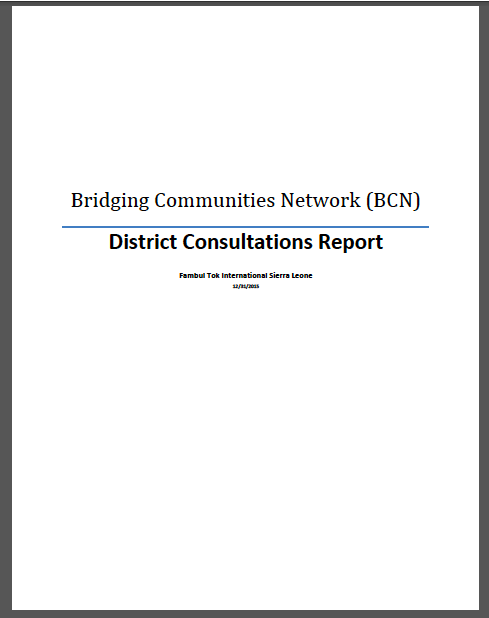As a part of efforts to strengthen community representation in Ebola response, Catalyst for Peace supported the creation of the Bridging Communities Network (BCN), a coalition of leading national NGOs in Sierra Leone and over 30 community based organizations, that formed in October, 2014 to facilitate a community-led response to country’s Ebola crisis.
Concerned by the lack of channels for community voices and perspectives in the national and international Ebola response, the BCN stepped into that gap. Fambul Tok International–Sierra Leone provided leadership for the initiative, wanting to build on its experience of how to mobilize community agency in reconciliation and development, and to see that learning applied in the Ebola crisis. You can read more about the BCN on the Fambul Tok blog.
The BCN immediately began a series of regional consultations in the country to solicit input from organizations and networks with direct presence in communities. The consultations yielded important insights on how the national Ebola response could be more effective, and how to better mobilize local communities to lead in preventing the spread of the virus and in responding to its impact on their communities.
The results of these consultations were compiled into a Report that was released at the end of December, highlighting these critical community insights. You can read and download the report here.
 CFP Senior Fellow and Fambul Tok Director John Caulker noted at the launch of the BCN that, “Sierra Leoneans should start finding solutions to their own problems rather waiting for, or relying on, only external leadership in responding to crises.” The seed funding that CFP provided to the BCN was designed to support just such capacity.
CFP Senior Fellow and Fambul Tok Director John Caulker noted at the launch of the BCN that, “Sierra Leoneans should start finding solutions to their own problems rather waiting for, or relying on, only external leadership in responding to crises.” The seed funding that CFP provided to the BCN was designed to support just such capacity.
The Report illustrates the need for and the potential of a process that puts communities at the center. When there are strong bridges to local communities in responding to a crisis, the legacy of crisis response efforts can be more than just rusty signs littering the landscape. With a broader commitment to this kind of inside-out approach, we believe the legacy of Ebola response can instead be permanent and lasting structures in place in communities themselves that support a network of vibrant, healthy, whole communities that are able to to advocate for their needs, facilitate their local development efforts and use outside resources wisely for the benefit of its citizens and communities
Blog banner image (c) Sara Terry for Catalyst for Peace

